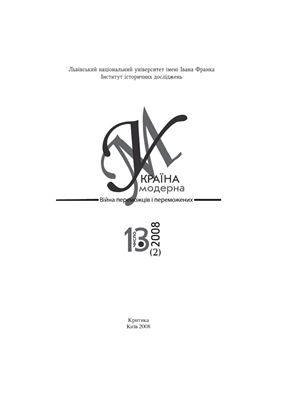Стаття. — Україна модерна. Війна переможців і переможених 2008 №13
(2). — К.: Критика. — С. 82-114.
Мета цієї статті – представити головні напрямки і проблемні поля
західної наукової дискусії, що точиться з приводу термінології та
методології студій геноциду, й описати суперечки щодо її
«українських сюжетів». Беручи до уваги, що дотепер українською
мовою не перекладено жодної класичної книжки з царини досліджень
геноциду, автор добре усвідомлює, що неминучі пропуски і
преференції у доборі матеріялів для цієї статті можуть створити у
читача враження лакун в історіографії проблеми. Статтю було
написано під час стажування в Центрі досліджень Голокосту і
геноциду (Амстердам), більшість думок та спостережень автор
завдячує надзвичайно продуктивним і відкритим дискусіям та
захопливій творчій атмосфері Центру.
The author attempts to present the main trends and themes in the
field of genocide studies. The article contains discussion of
definitions of genocide and a brief overview of the history of
genocide studies as a field developing in close contact with
political and media challenges. The article also sketches the main
problematics of the field: genocide and modeity, genocide and war,
the questions of terminology and research methodologies. Portnov
analyzes various comparative approaches to the study of Nazism and
Communism and discussions around Soviet totalitarianism, which, in
the author’s opinion, reveal more about the scholarly and
politico-ideological contexts of German, French and American
academia than about the subject of discussion. The author
conceptualizes the famine of 1932-33 as a challenge to the theory
of genocide and notes its major problematic points: the issue of
intentionality of Stalin’s policy; national dimensions of the
famine in Ukraine; and the problem of perpetrators on various
levels of Soviet bureaucracy. Portnov also proposes a brief
introduction to the problematics of the Holocaust in Ukraine and
Ukrainian topics in the history of ethnic cleansing (anti-Polish
campaign of the Ukrainian Insurgent Army in Volhynia in 1943 and
Soviet deportations of Crimean Tatars in 1944). The author
emphasizes moral and legal dimensions of the studies of genocides
and urges sensitivity to the strategies of their denial or
relativization.
Портнов Андрій. Концепції геноциду та етнічних чисток: західні наукові дискусії і місце в них українських сюжетів
Статья

- формат pdf
- размер 295,51 КБ
- добавлен 27 сентября 2015 г.

